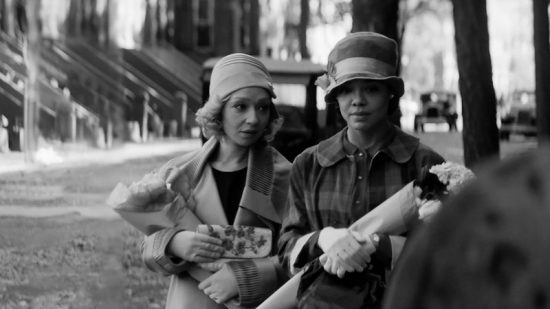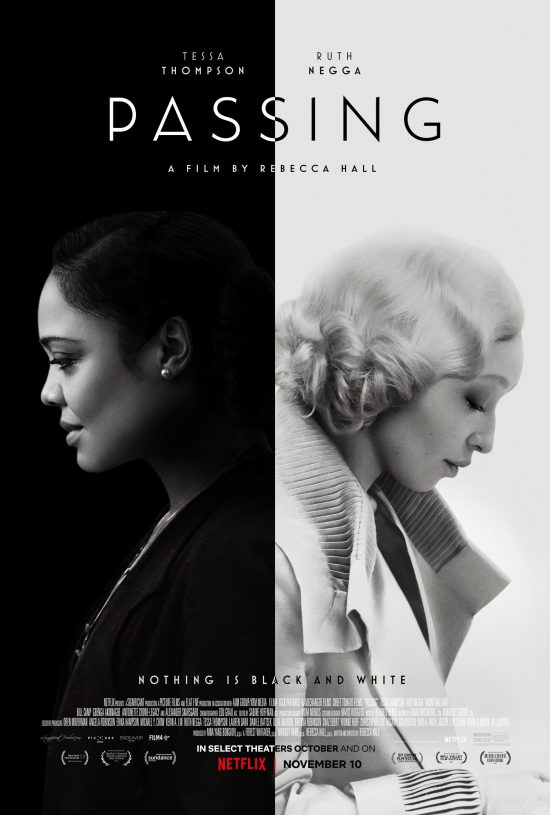Review: Passing -“Entertaining, horrifying and deceptively layered.”

Ruth Negga and Tessa Thompson appear in Passing by Rebecca Hall, an official selection of the U.S. Dramatic Competition at the 2021 Sundance Film Festival. Courtesy of Sundance Institute | photo by Edu Grau.
Question. Have you lied to impress someone? Or maybe you’ve not corrected an inaccuracy, because you liked how it made you sound. We all want to be and look our best, and social media makes it so much easier, but luckily, our lives don’t depend on forever maintaining a lie.
Another question. How much do you care about the directors of movies? Does it matter who they are and what they’ve experienced, or is it irrelevant as long as the films they make are entertaining?
These questions arise as part of the lore around Passing. Rebecca Hall, well known as an actress in Frost/Nixon, Iron Man 3 and Christine makes her directorial debut in stunning form. It’s usually unwise to bring up what a director looks like in discussion of their art, but here, it’s pertinent. Hall is pale-skinned and willowy with a natural English accent and degree from Cambridge, the daughter of white theatre director Peter Hall. She is also the daughter of Maria Ewing, a mixed-race opera singer with black and Native American ancestry. Hall may well have been inadvertently passing all her life, and it makes perfect sense for her to make this movie. So, what does passing mean?
The film centres on two black friends, Irene (Tessa Thompson) and Clare (Ruth Negga) who happen to chance upon one another in a hotel, in New York City, some time in the 1920s. After growing up together, each woman made different choices, Irene marred an upwardly mobile black doctor (Andre Holland) while Clare left the neighbourhood and began passing – being recognised as white in society – marrying a horrible racist businessman (Alexander Skarsgard, fattening his CV with another hateful part). The two women rekindle their friendship and Clare inserts herself into Irene’s family life at risk of upending both marriages. It becomes clear that both friends are hiding more secrets.
Shot in black and white, in 4:3 aspect ratio, and adapted by Hall from the 1929 novel by Nella Larsen, Passing looks and feels like an elegant straight-jacket, Hall boxes in her leads as they swelter under the New York City sun. It’s an engaging story comparing frenetic jazz nights with serene tea parties, always keeping the underlying threat of Irene’s exposure as the pumping heart. Hall excels is in her subtle layering of subtext over premise, Passing acknowledges the competing binds of class, sexuality and wealth while never removing agency from the leads. To say more would detract from the experience of unravelling the elegant deceptions within. This film, like the book, treats Irene and Clare with sympathy, partly because Thompson and Negga are so good in depicting repression and longing, partly from cinematographer Eduard Grau’s camera catching a look or a touch which hint at things brewing beneath the surface. As an actor, Hall also has an excellent nose for choosing supporting roles. Bill Camp is great as a white writer and confidante of Irene’s, and Holland truthfully plays a loving, oblivious husband. All the women at the time relied on their smarts, and Hall acknowledges this in small ways, like allowing Irene’s housekeeper Zu (Ashley Ware Jenkins) to spit a line or two. Keeping up the tension to the end, Passing is a gem, entertaining and horrifying in equal measure without ever being depressing.
Passing asks all the right questions. This should herald the start of Hall’s directorial career, because she clearly has a lot to say, and we should listen.










